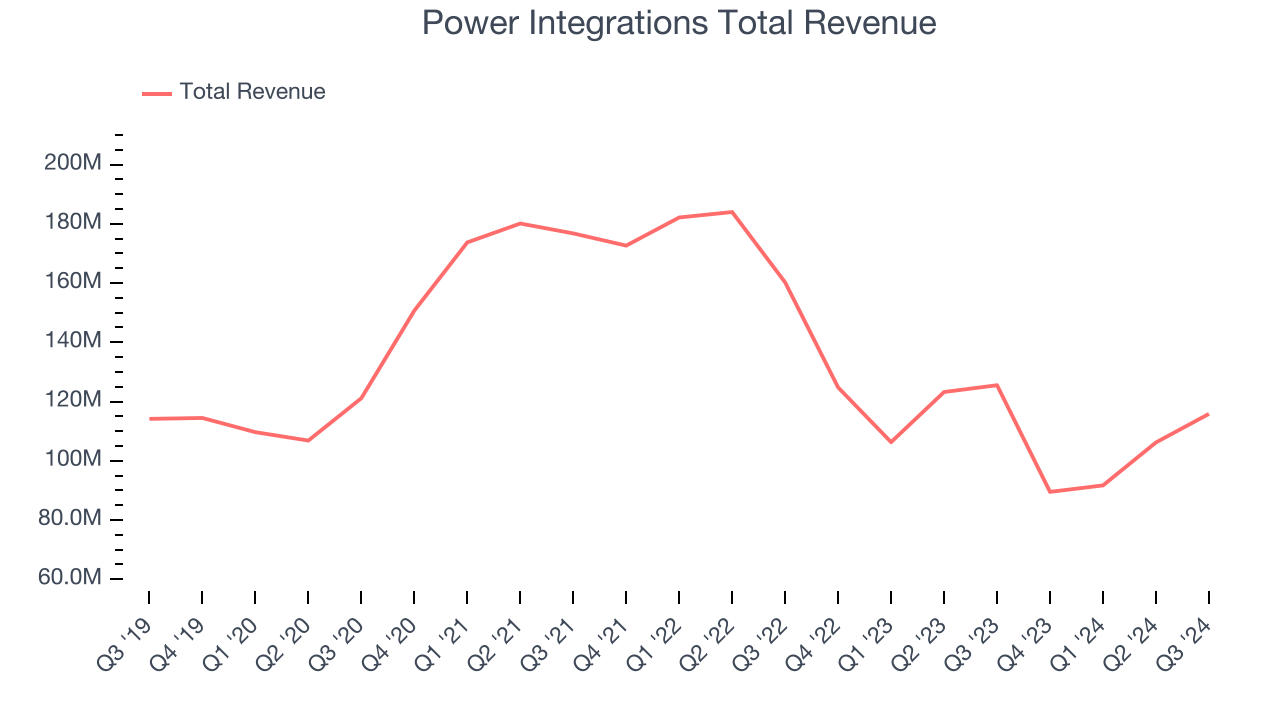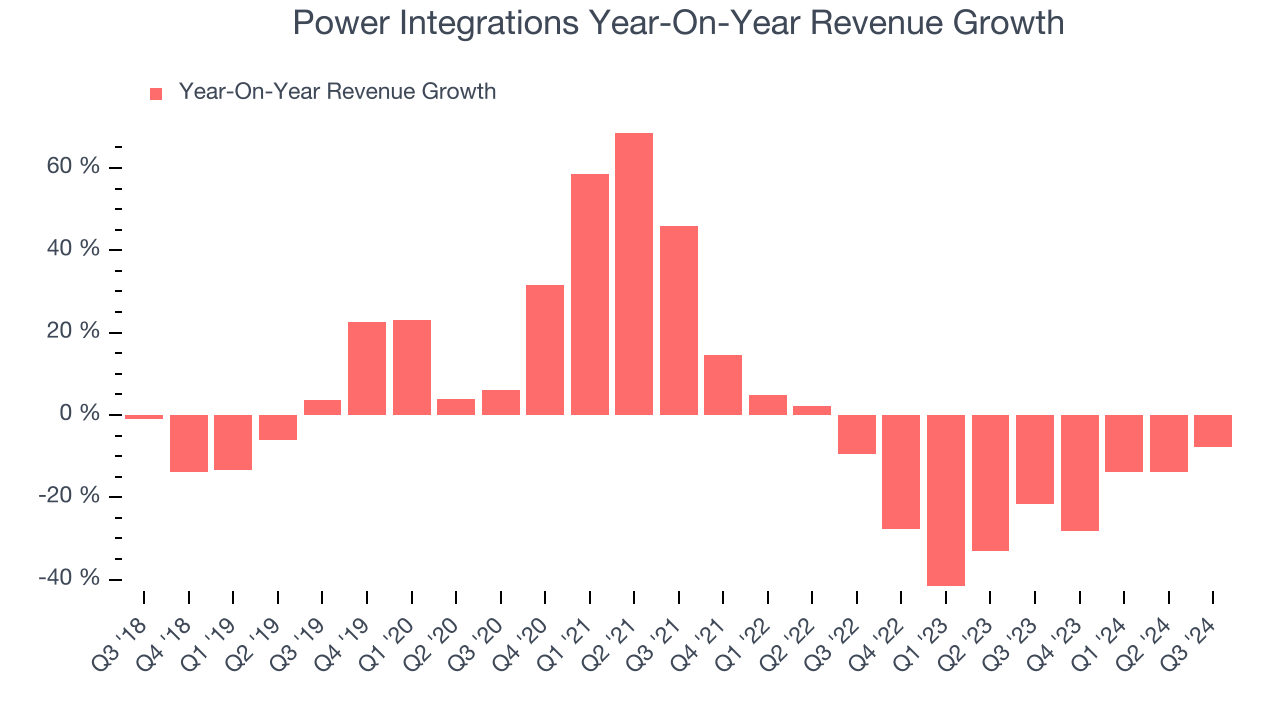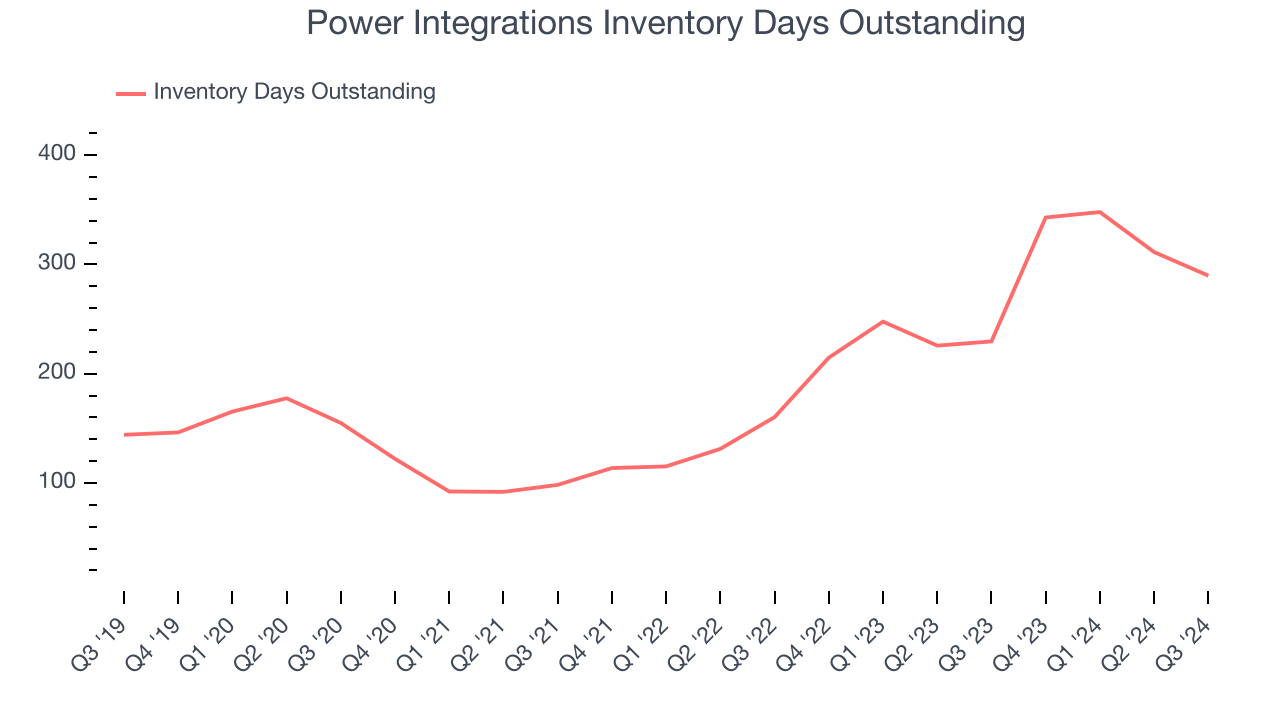
Semiconductor designer Power Integrations (NASDAQ:POWI) met Wall Street’s revenue expectations in Q3 CY2024, but sales fell 7.7% year on year to $115.8 million. On the other hand, next quarter’s revenue guidance of $105 million was less impressive, coming in 11.9% below analysts’ estimates. Its non-GAAP profit of $0.40 per share was 11.3% above analysts’ consensus estimates.
Is now the time to buy Power Integrations? Find out by accessing our full research report, it’s free.
Power Integrations (POWI) Q3 CY2024 Highlights:
- Revenue: $115.8 million vs analyst estimates of $114.8 million (in line)
- Adjusted EPS: $0.40 vs analyst estimates of $0.36 (11.3% beat)
- Adjusted Operating Income: $20.07 million vs analyst estimates of $18.23 million (10.1% beat)
- Revenue Guidance for Q4 CY2024 is $105 million at the midpoint, below analyst estimates of $119.2 million
- Gross Margin (GAAP): 54.5%, up from 52.5% in the same quarter last year
- Inventory Days Outstanding: 290, down from 311 in the previous quarter
- Operating Margin: 10%, down from 14.1% in the same quarter last year
- Free Cash Flow Margin: 23.5%, up from 15.3% in the same quarter last year
- Market Capitalization: $3.67 billion
Company Overview
A leading supplier of parts for electronics such as home appliances, Power Integrations (NASDAQ:POWI) is a semiconductor designer and developer specializing in products used for high-voltage power conversion.
Analog Semiconductors
Demand for analog chips is generally linked to the overall level of economic growth, as analog chips serve as the building blocks of most electronic goods and equipment. Unlike digital chip designers, analog chip makers tend to produce the majority of their own chips, as analog chip production does not require expensive leading edge nodes. Less dependent on major secular growth drivers, analog product cycles are much longer, often 5-7 years.
Sales Growth
Examining a company’s long-term performance can provide clues about its business quality. Any business can put up a good quarter or two, but the best consistently grow over the long haul. Over the last five years, Power Integrations’s sales were flat. This shows demand was soft and is a tough starting point for our analysis. Semiconductors are a cyclical industry, and long-term investors should be prepared for periods of high growth followed by periods of revenue contractions.

We at StockStory place the most emphasis on long-term growth, but within semiconductors, a half-decade historical view may miss new demand cycles or industry trends like AI. Power Integrations’s recent history shows its demand has stayed suppressed as its revenue has declined by 24% annually over the last two years. 
This quarter, Power Integrations reported a rather uninspiring 7.7% year-on-year revenue decline to $115.8 million of revenue, in line with Wall Street’s estimates. Management is currently guiding for a 17.3% year-on-year increase next quarter.
Looking further ahead, sell-side analysts expect revenue to grow 23.2% over the next 12 months, an improvement versus the last two years. This projection is healthy and indicates the market thinks its newer products and services will catalyze higher growth rates.
Unless you’ve been living under a rock, it should be obvious by now that generative AI is going to have a huge impact on how large corporations do business. While Nvidia and AMD are trading close to all-time highs, we prefer a lesser-known (but still profitable) semiconductor stock benefitting from the rise of AI. Click here to access our free report on our favorite semiconductor growth story.
Product Demand & Outstanding Inventory
Days Inventory Outstanding (DIO) is an important metric for chipmakers, as it reflects a business’ capital intensity and the cyclical nature of semiconductor supply and demand. In a tight supply environment, inventories tend to be stable, allowing chipmakers to exert pricing power. Steadily increasing DIO can be a warning sign that demand is weak, and if inventories continue to rise, the company may have to downsize production.

This quarter, Power Integrations’s DIO came in at 290, which is 101 days above its five-year average. These numbers suggest that despite the recent decrease, the company’s inventory levels are higher than what we’ve seen in the past.
Key Takeaways from Power Integrations’s Q3 Results
We were impressed by how significantly Power Integrations blew past analysts’ EPS expectations this quarter. We were also glad its inventory levels shrunk. On the other hand, its revenue guidance for next quarter missed analysts’ expectations and its operating margin shrunk. Zooming out, we think this was a mixed quarter. The stock remained flat at $66.39 immediately following the results.
Big picture, is Power Integrations a buy here and now? The latest quarter does matter, but not nearly as much as longer-term fundamentals and valuation, when deciding if the stock is a buy. We cover that in our actionable full research report which you can read here, it’s free.













